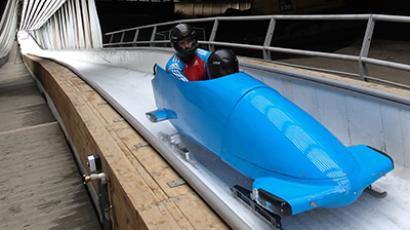If you build it, they will come: Foreign experts to help fill Russian stadiums
Russia should rely on the Bundesliga’s experience to see their arenas packed for the Sochi Olympics and World Cup 2018, believes Arsenal’s stadium manager, John Beattie.
Russian sport is in a period of transition. For decades there was a lack of funding both on and off the pitch.However, this has all changed since the country won its bids to host two of the biggest sporting events over the next few years – the 2014 Winter Olympics and the 2018 FIFA World Cup. And these changes will be felt by sports fans for generations to come.“It’s fantastic to see the investment in infrastructure,” Steve Cumming, Chelsea’s head of commercial partnerships, told RT. “It’s a big step change that will really develop the experience for the fans. It’s fantastic to see the World Cup coming to this part of the world as well.” Attendances at sporting events, especially in Moscow, tend not to be very high.Firstly a number of facilities are outdated, while the arenas can often be difficult to get to, especially with the clogged city traffic.The weather also doesn't help, with temperatures often dropping below freezing point as early as October. And Arsenal’s John Beattie, who's had over 20 years of experience in stadium management, says things need to change. “It’s very difficult because you’ve got to have this history of sports within your country and you’ve got to have that fan base, which was always there,” he explained. “I think England is probably not a good model. The model to look at how to develop and encouraging the fans back is the German model. If you go back to Germany five years ago – the crowd was diminishing. They looked at that, they took on board the fact that they have to do something about it. They built better stadiums and facilities, they lowered the ticket prices to actually encourage the fans there. When you, actually, look at it now, the Bundesliga is one of the booming leagues that’s around.”There has been a slow realization in Russia that in order for fans to come to stadiums they need to be well looked after.In North America, going to a basketball or hockey game is an experience for the whole family, though the prices can be high.However, in Russia, once the fans are inside the stadiums, there is often very little for them to do, with a few exceptions. “We probably never thought about building a sports facility as a commercial building,” Andrey Peregudov, VTB Bank’s senior vice president, says. “That’s definitely what is mostly done in the US, Canada and the UK. That’s where we have to learn.” Peregudov was quick to point out the example of Donetsk in Ukraine as to how a new stadium can rejuvenate a city. The Donbass Arena was opened in 2009 and is one of the best stadiums in Europe.“What I know for sure, if you do a good building and a nice friendly environment – people act better,” he said. “And I saw it Donetsk. The character of the crowd there changed greatly with the fact of the new stadium because it so good and people don’t want to spoil it.”The interest and development of ice hockey in Russia has been significant over the last few years.The Moscow clubs have always struggled to attract fans, put off by poor arenas and an average standard of play.However, the KHL is now booming, given an influx of top-notch players, playing in fantastic stadiums. And this is certainly a fantastic model for Russia to follow in the future, to help develop sport in the country.














